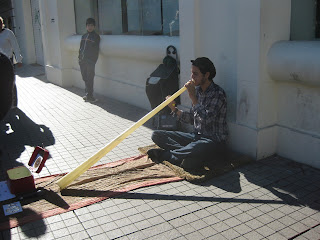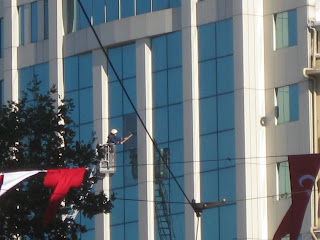 |
| One of Amsterdam's many canals, between downpours. |
The water cascaded down on us without warning. It was like a cheesy bit from a movie: Five people walking down the sidewalk and suddenly a taxi whips past, shooting water onto the poor, shivering group. David, to my right, took the brunt of the splash. His curly hair was already matted and glistening with droplets of rain. Now his t-shirt was soaked beneath his black wool coat. Water was in my right ear, so I tipped my head to the side and shook it out, eliciting a laugh from Veronica. At least we’d finally found some entertainment on this dreary evening.
When the five of us set out that night, we hadn’t quite known what to expect, or even what we were looking for. The girls – Veronica and Katerina, friends from Germany – were hungry, while I and the other two guys – David and Adam, friends from Australia – just wanted a place to drink. It was the first trip to Amsterdam for each of us, and we weren’t sure what a Tuesday night would hold. We’d seen advertisements at our hostel, where we shared a room, for events happening Wednesday and Thursday, but nothing for tonight. Rather than stay in and be bored though, we went looking for action.
I was the odd man out in our group. When I’d arrived on Monday, the others had already exchanged formalities. They paired up that night while I turned in early, resting up from my trip in. Adam told me the next morning, referring to Veronica, “She is the hottest girl I’ve ever hooked up with.” I believed it. I couldn’t see anything special in the way Adam looked, but Veronica was stunning. About 5-foot-9 with straight blond hair, a beautiful face and curves in the right places, she looked like the type of woman that would catch Hugh Hefner’s eye. But ‘hooking up’ is such a broad term that I wasn’t sure if they’d shared a kiss, had drunken sex, or done something in between. When asked about Katerina, David just gave a shy smile and said he might be interested.
Whatever happened while I was snoozing must not have been too serious, though. When I returned to the room Tuesday evening after a walking tour through the Red Light District, the four of them invited me and another roommate to check out the midweek nightlife. They all seemed to be nothing more than friends looking to add to their numbers.
Now, the weather in Amsterdam is notoriously unpredictable. During my walking tour, it alternated sporadically between clear skies, downpours and drizzle. When the five of us left the hostel, we did so wearing what we hoped would keep us dry for a short walk to the nearest entertainment. After about a kilometer of walking, we came to a pub and the end of the lively downtown area. We were beginning to get damp, but the pub didn’t appeal to any of us. Nor had any of the coffeeshops or bars we’d passed along the way. We turned and kept walking. The girls knew of a club across town that was sure to be fun.
We kept on through quiet, dark streets for another 20 minutes. My hoody was getting wetter by the second, and my confidence in the girls’ sense of direction was waning. Finally we entered Rembrandtplein, supposedly the happening place to be on a Tuesday night in Amsterdam. Restaurants and bars lined the square, but most were dark. We spotted one on the corner that was lit up and loud and went in. But after a quick assessment, we decided the small crowd was too old for us. We were wet and tired of walking, but we couldn’t settle. We left the square and headed up another soggy street along one of the canals.
None of us noticed the huge puddle or the speeding taxi until it was too late. With a sudden whoosh, the cab was past us and we were soaked. We shivered and tried to shake ourselves dry, but mostly we laughed. We were no longer in any condition to dance or drink, so we headed back to the hostel for warm showers and hairdryers and another night in, half-heartedly cursing our luck through smiles.  |
| Dutch humor |

















